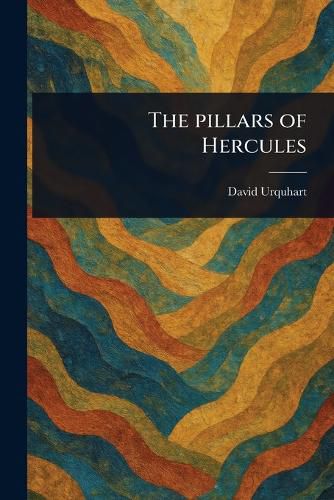Readings Newsletter
Become a Readings Member to make your shopping experience even easier.
Sign in or sign up for free!
You’re not far away from qualifying for FREE standard shipping within Australia
You’ve qualified for FREE standard shipping within Australia
The cart is loading…






This title is printed to order. This book may have been self-published. If so, we cannot guarantee the quality of the content. In the main most books will have gone through the editing process however some may not. We therefore suggest that you be aware of this before ordering this book. If in doubt check either the author or publisher’s details as we are unable to accept any returns unless they are faulty. Please contact us if you have any questions.
"The Pillars of Hercules: A Narrative of Travels in Spain and Morocco in 1848" offers a captivating journey through the Iberian Peninsula and North Africa as seen through the eyes of David Urquart. This meticulously prepared edition allows readers to experience Spain and Morocco as they were in 1848, visiting key locations like Gibraltar and Tangier.
Urquart's detailed observations provide a rich historical and geographical account, transporting the reader to a bygone era. Explore the cultural nuances and landscapes of both countries, gaining insights into their history and the unique character of the region. This book is a valuable resource for anyone interested in the history of travel writing, Spanish history, or the allure of Morocco. Discover a timeless narrative that bridges continents and cultures.
This work has been selected by scholars as being culturally important, and is part of the knowledge base of civilization as we know it.
This work is in the public domain in the United States of America, and possibly other nations. Within the United States, you may freely copy and distribute this work, as no entity (individual or corporate) has a copyright on the body of the work.
Scholars believe, and we concur, that this work is important enough to be preserved, reproduced, and made generally available to the public. We appreciate your support of the preservation process, and thank you for being an important part of keeping this knowledge alive and relevant.
$9.00 standard shipping within Australia
FREE standard shipping within Australia for orders over $100.00
Express & International shipping calculated at checkout
This title is printed to order. This book may have been self-published. If so, we cannot guarantee the quality of the content. In the main most books will have gone through the editing process however some may not. We therefore suggest that you be aware of this before ordering this book. If in doubt check either the author or publisher’s details as we are unable to accept any returns unless they are faulty. Please contact us if you have any questions.
"The Pillars of Hercules: A Narrative of Travels in Spain and Morocco in 1848" offers a captivating journey through the Iberian Peninsula and North Africa as seen through the eyes of David Urquart. This meticulously prepared edition allows readers to experience Spain and Morocco as they were in 1848, visiting key locations like Gibraltar and Tangier.
Urquart's detailed observations provide a rich historical and geographical account, transporting the reader to a bygone era. Explore the cultural nuances and landscapes of both countries, gaining insights into their history and the unique character of the region. This book is a valuable resource for anyone interested in the history of travel writing, Spanish history, or the allure of Morocco. Discover a timeless narrative that bridges continents and cultures.
This work has been selected by scholars as being culturally important, and is part of the knowledge base of civilization as we know it.
This work is in the public domain in the United States of America, and possibly other nations. Within the United States, you may freely copy and distribute this work, as no entity (individual or corporate) has a copyright on the body of the work.
Scholars believe, and we concur, that this work is important enough to be preserved, reproduced, and made generally available to the public. We appreciate your support of the preservation process, and thank you for being an important part of keeping this knowledge alive and relevant.